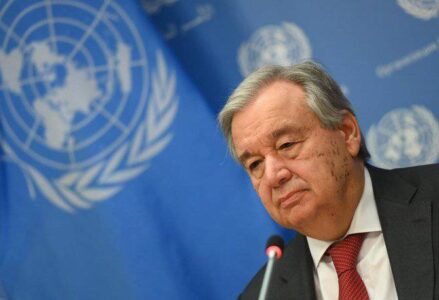
UN head Guterres: Islamic State terrorist threat is rising
The threat to international peace and security from the Islamic State group is rising, UN Secretary-General Antonio Guterres said in a report released on Tuesday.
There is an “alarming” expansion of Islamic State affiliates in Africa and it is focused on a comeback in its former self-declared “caliphate” in Syria and Iraq, Guterres said.
The report to the UN Security Council said that the Islamic State and other groups have taken advantage on the ground and online of “the disruption, grievances and development setbacks” caused by the COVID-19 pandemic.
While lockdowns in areas without conflict suppressed terrorist activity, in conflict areas where pandemic restrictions have less impact, the threat from the Islamic State “has already increased,” Guterres said.
“As pandemic-related restrictions gradually ease, there is an elevated near-term threat of Daesh-inspired attacks outside conflict zones by lone actors or small groups that have been radicalized, incited and possibly directly remotely online,” he said, using an Arabic-language acronym for the Islamic State.
This exemplifies a wider and evolving risk from the accelerated use of digital technologies during the pandemic, and the potential for “new and emerging technologies to be used for terrorist purposes,” he said.
In assessing the Islamic State’s threat, Guterres said that its leader, Amir Muhammad Sa’id Abdal-Rahman al-Mawla, “remains reluctant to communicate directly with supporters,” and “the group’s command and control over its global affiliates has loosened, even though it continues to provide guidance and some financial support.”
The autonomy of regional affiliates has strengthened, especially in west Africa and the Sahel, east and central Africa, Afghanistan and South Asia, Guterres said.
This evolution will be an important factor in the group’s global impact, he quoted unidentified UN member states as saying.
Member states also said that the group “will continue to prioritize regrouping and seeking resurgence” in Iraq and Syria as its core area of operations, he said.
The 16-page report, prepared by Security Council counterterrorism committee and by experts monitoring sanctions on the Islamic State, said that the group remains active in wide swaths of Syria, where it is seeking to rebuild its combat capabilities and expand its insurgency.
The group wages hit-and-run operations against checkpoints from hideouts on both sides of the Euphrates River in the eastern province of Deir el-Zour and continues operations against government forces and in the Syrian desert, Guterres said.
Source: Taipei Times





